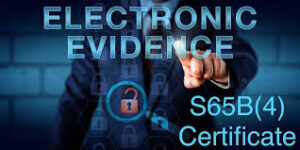
The Hon’ble Supreme Court: In a reference dealing with the interpretation of Section 65B of the Evidence Act, 1872 that deals with admissibility of electronic records, the 3-judge bench has held that the certificate required under Section 65B(4) is a condition precedent to the admissibility of evidence by way of electronic record, as correctly held in by the 3-judge bench in Anvar P.V. v. P.K. Basheer, (2014) 10 SCC 473, and incorrectly “clarified” by a division bench in Shafhi Mohammad v. State of Himachal Pradesh, (2018) 2 SCC 801. The Court further clarified that the required certificate under Section 65B(4) is unnecessary if the original document itself is produced.
The High Court then set out Sections 65-A and 65-B of the Evidence Act, and referred to this Court’s judgment in Anvar P.V. (supra).
The Court held in paragraph 65 of the impugned judgment that the CDs that were produced by the Election Commission could not be treated as an original record and would, therefore, have to be proved by means of secondary evidence. Finding that no written certificate as is required by Section 65-B(4) of the Evidence Act was furnished by any of the election officials, and more particularly, the RO, the High Court then held:
“69. In substantive evidence, in the cross examination of Smt. Mutha, it is brought on the record that there was no complaint with regard to working of video cameras used by the office. She has admitted that the video cameras were regularly used in the office for recording the aforesaid incidents and daily VCDs were collected of the recording by her office. This record was created as the record of the activities of the Election Commission. It is brought on the record that on the first floor of the building, arrangement was made by keeping electronic gazettes like VCR players etc. and arrangement was made for viewing the recording. It is already observed that under her instructions, the VCDs were marked of this recording.
Thus, on the basis of her substantive evidence, it can be said that the conditions mentioned in section 65-B of the Evidence Act are fulfilled and she is certifying the electronic record as required by section 65-B (4) of the Evidence Act. It can be said that Election Commission, the machinery avoided to give certificate in writing as required by section 65-B (4) of the Evidence Act. But, substantive evidence is brought on record of competent officer in that regard. When the certificate expected is required to be issued on the basis of best of knowledge and belief, there is evidence on oath about it of Smt. Mutha. Thus, there is something more than the contents of certificate mentioned in section 65-B (4) of the Evidence Act in the present matters. Such evidence is not barred by the provisions of section 65-B of the Evidence Act as that evidence is only on certification made by the responsible official position like RO. She was incharge of the management of the relevant activities and so her evidence can be used and needs to be used as the compliance of the provision of section 65-B of the Evidence Act. This Court holds that there is compliance of the provision of section 65-B of the Evidence Act in the present matter in respect of aforesaid electronic record and so, the information contained in the record can be used in the evidence.” Based, therefore, on “substantial compliance” of the requirement of giving a certificate under Section 65B of the Evidence Act, it was held that the CDs/VCDs were admissible in evidence, and based upon this evidence it was found that, as a matter of fact, the nomination forms by the RC had been improperly accepted. The election of the RC was therefore was declared void in the impugned judgment.
Case Referred : Arjun Panditrao Khotkar vs Kailash Kushanrao Gorantyal

